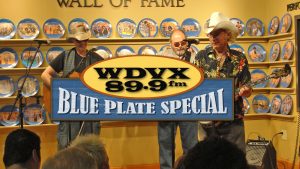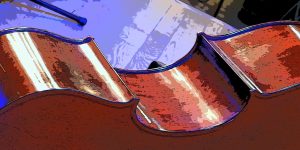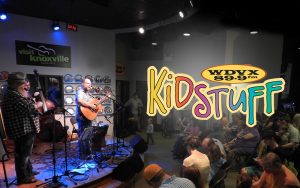
- This event has passed.
Tennessee Shines – 2/7 – Sunny War / Chatham Rabbits & Tyler Ramsey!
February 7, 2024 @ 7:00 pm $30
WDVX welcomes EmiSunshine as your host for the evening!
Tyler Ramsey’s forthcoming album “New Lost Ages”, out Feb. 9th, is an album of hope and an album of sorrow. It is an album of shadows and light. It is about the calm that follows the storm and it’s about the dark clouds when they roll back in again.
Just as the opening line in the title track melody proposes — “we’re living in a world that we can’t understand” — so, too, becomes this notion that to truly find yourself in the ether and incessant white noise of modern society, one must simply let go of ego, pain and trauma in exchange for pure love.
“I’m trying harder and harder to just roll with things and make moments that are beautiful, to appreciate everything we have,” Ramsey says. “I’m trying to just be here and in the moment, with my family and with my music, and not get caught up in the sadness and fear that lies out there in our world — to always pursue hope and compassion.”
Captured at the legendary Avast! Recording Co. in Seattle, Washington, by storied producer Phil Ek (Fleet Foxes, Father John Misty, The Shins, Built to Spill), the 10-song LP is an ongoing sonic quest within Ramsey — meticulously wandering across the musical landscape, this undulating tone of indie, rock and folk stylings.
“Each album carries me down a different path, every record drawing in new people, new experiences,” Ramsey says. “And ‘New Lost Ages’ was this new process, where I really trusted a producer by handing over my songs and was willing to work on anything that he felt needed work.”
Situated in a power-trio formation — including bassist Morgan Henderson (Fleet Foxes) and drummer Sean Lane (Ann Wilson) — Ramsey found himself fronting a full-on rock outfit, a scenario that conjured fresh inspiration and straightforward determination within the recording process.
“At first, it was intimidating to walking into a room with these super talented musicians and just put my songs down in front of them,” Ramsey says. “But, they’re killer musicians and we were able to pull it off in a short amount of time. We figured out all of the arrangements pretty quickly and played our parts live.”
“I feel like there are two sides of me,” says the Nashville-based singer-songwriter and guitar virtuoso known as Sunny War. “One of them is very self-destructive, and the other is trying to work with that other half to keep things balanced.” That’s the central conflict on her fourth album, the eclectic and innovative Anarchist Gospel, which documents a time when it looked like the self-destructive side might win out. “Everybody is a beast just tryin g their hardest to be good. That’s what it is to be human. You’re not really good or bad. You’re just trying to stay in the middle of those two things all the time, and you’re probably doing a shitty job of it. That’s okay, because we’re all just monsters.”
Extreme emotions can make that battle all the more perilous, yet from such trials Sunny has crafted a set of songs that draw on a range of ideas and styles, as though she’s marshaling all her forces to get her ideas across: ecstatic gospel, dusty country blues, thoughtful folk, rip-roaring rock and roll, even avant garde studio experiments (like the collage of voices that closes “Shelter and Storm”). She melds them together into a powerful statement of survival, revealing a probing songwriter who indulges no comforting platitudes and a highly innovative guitarist who deploys spidery riffs throughout every song.
It’s a style she’s been honing for most of her life, at least since she took her first guitar lessons and fell in love with music. “When I was a kid, I was obsessed with AC/DC, and I loved dramatic ‘80s guitar bands like Motley Crüe. Later, I was obsessed with Bad Brains, the Minutemen, and X.” True to the punk ethos, her first punk band, the Anus Kings, made music with whatever they had at hand, and what they had at hand were acoustic guitars. That made them stand out among other Los Angeles groups at the time, and today Sunny is the rare roots artist who covers Ween and can drop a Crass reference into a song (as she does on “Whole”). “I don’t really make music with a traditional roots audience in mind. I like weird music, outsider music, like Daniel Johnston and Roky Erickson.”
North Carolina is a place so identifiable by its separate regions – the mountains, the piedmont, the coast – that it has the tendency to feel indescribable, meaning one can conceptualize the state as a mashup of places rather than a single locale. The art and artists born from the state often embody that same sense of blended regions, borrowing from broad cultural traditions and plumbing the histories of others’ stories on the way to telling their own. Because of this, many North Carolina artists can call a particular region home, but their work belongs to the state because the entirety of the state has opened itself to them and they have opened themselves to it. Chatham Rabbits exemplify North Carolina’s tradition of producing artists who embrace the state’s many cultural resources and diverse musical traditions.
In their marriage and in their music, Chatham Rabbits’ Austin and Sarah McCombie also blend their own histories into a shared musical experience. Sarah first took the stage as part of a trio known as the South Carolina Broadcasters, a band that harkened back to the old days of the Grand Ole Opry and AM radio country classics. Meanwhile, Austin played keyboards and guitar for an electronic band called DASH. Given these histories, how would Chatham Rabbits describe their musical marriage?
“We’re not purists,” Austin says.“ And we’re certainly not the hippest,” Sarah adds.
“But we’ve been able to belong nowhere and everywhere at the same time,” Sarah says, and I would have to agree.
The first time I saw Chatham Rabbits play live they were opening for the Steep Canyon Rangers at an outdoor amphitheater in Wilmington, North Carolina. As Austin and Sarah kicked off their set, I was both mystified and confused by what I was seeing. How could two young people so perfectly embody the sound and feeling of old-time music? How could two people so well versed in old-time music recast it in a way that felt new and fresh? As soon as the show was over, I worked my way backstage, hoping to meet Austin or Sarah or both. But they weren’t back there. They were out front, mingling with the audience, signing copies of their new record, and hearing stories from new fans and sharing stories of their own.








